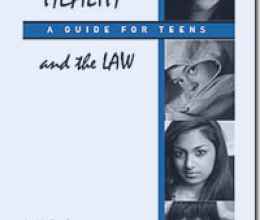Check out our teaching resources for PowerPoint presentations, outlines, and other tools to help present information about teens’ health rights.
QUESTION: Julia is 17 years old. She is mature and fully capable of understanding her medical condition as well as the risks and benefits of various treatments. Julia wants to consult a doctor about her severe allergies, but her parents have refused to grant her permission because of their religious beliefs. Can she consent to her own health care?
ANSWER ↕
Probably not, but her parents do not have the right to refuse her treatment based on their religious beliefs. Julia is entitled to receive treatment which is in her best interest. She may need to go to court and petition a judge to receive the treatment. If she decides to go to court, Julia may want to talk to a lawyer about this process. However, if Julia’s allergies are life threatening, a doctor would be able to treat her without parental consent because life threatening illnesses count as emergency situations.
QUESTION: Jack is 18 and mentally impaired. He’s an adult, can he consent to his own care?
ANSWER ↕
Maybe, if the doctor determines that Jack understands his medical condition and the consequences of various treatments, he can consent to his own health care. However,
no patient can give informed consent unless that patient understands the risks and benefits of the treatment option.
QUESTION: A public health officer tells Larry that he may have a sexually transmitted disease (STD). Can the officer tell Larry who transmitted it?
ANSWER ↕
No, the officer can reveal only that Larry is at risk. He or she cannot reveal the name of the contact.
QUESTION: Rahim, 15, is severely depressed and wants medical treatment. His parents, however, refuse to allow it. The physician believes that he needs to be treated. Can the doctor treat Rahim?
ANSWER ↕
Yes, if Rahim consents to the treatment.
QUESTION: Kate, who is 17, had sex last night with her boyfriend and the condom broke. She’s scared that she will get pregnant and her parents will find out. Is there anything she can do?
ANSWER ↕
Yes, Kate can use emergency contraception (EC), which is also called “the morning after pill.” EC is more effective the sooner it is used. The first dose should be taken within 72 hours of sexual activity; however, if it is used within five days (120 hours) of sexual activity, it still will significantly reduce the chances of pregnancy. Kate needs a prescription for an EC, so she has to see a doctor or go to a clinic. Many clinics that provide birth control also provide EC. She does not need parental consent to get EC, and the services can be provided confidentially.
QUESTION: Mrs. Smith is a school nurse. One of her patients, a 16-year-old, has a bad case of the flu and wants the nurse to call a doctor. Can Mrs. Smith give the student’s medical files to the doctor?
ANSWER ↕
Probably not in this situation. In certain cases, a minor can authorize disclosure of health information. However, this generally is up to the parents.
QUESTION: Jorge has been living on his own since he was 15. For the past two years, and he has supported himself financially. He’s not in regular communication with either of his parents. Jorge needs to have his wisdom teeth pulled. Can the dentist perform the surgery without the consent of Jorge’s parents?
ANSWER ↕
Maybe, a minor who’s not emancipated may be classified as mature and be able to consent to treatment. This means that Jorge must understand the risks and consequences of the proposed dental procedure. Courts and physicians decide this on a case-by-case basis.
QUESTION: Lee, 16, has a drinking problem. He is thinking about going to a school counselor, but he’s afraid his parents will find out. Can he receive counseling without parental consent?
ANSWER ↕
Yes, a minor doesn’t need parental consent to receive counseling. If the counselor decides to treat Lee, his parents cannot be notified without his consent.
QUESTION: Maria, who’s 16, receives confidential medical treatment. Although she doesn’t need or want to obtain parental consent, she wants her parents' insurance plan to pay for the treatment. Will information about her treatment be disclosed to her parents?
ANSWER ↕
The health-care provider can’t disclose the information to Maria’s parents. However, it’s possible that some information will be disclosed to them during the insurance reimbursement process. By asking the insurance company about the risks of disclosure first, Maria will be well informed before deciding where to seek care and how to pay for it.
Download a handout of questions and answers about all the real-life situations featured in the teen health guide.
Important Information
The material provided here is for basic informational purposes only. It’s not meant to be taken as legal advice, nor should you rely on this information instead of seeking the advice of an attorney. The legal issues surrounding civil rights and civil liberties are among the most complex in the law, and a person’s rights may vary from case to case depending on small and subtle details. Only a lawyer who has taken the time to become fully aware of the facts in a given case can provide you with sound legal advice.
Read more ↕
If you feel your rights have been violated, contact an attorney at once. The law imposes time limits on most actions to defend your rights, so it’s important to act quickly. If you do not know how to reach an attorney, call the lawyer referral service of your local bar association. They will be able to direct you to a lawyer experienced in the type of law involved in your case.
If you are under 18, finding a lawyer can be difficult. Many lawyers don’t represent minor clients without a parent’s permission. If it’s possible, speak to a trusted adult about finding a lawyer. Legal clinics based in universities may be able to assist minors in figuring out their legal options.













